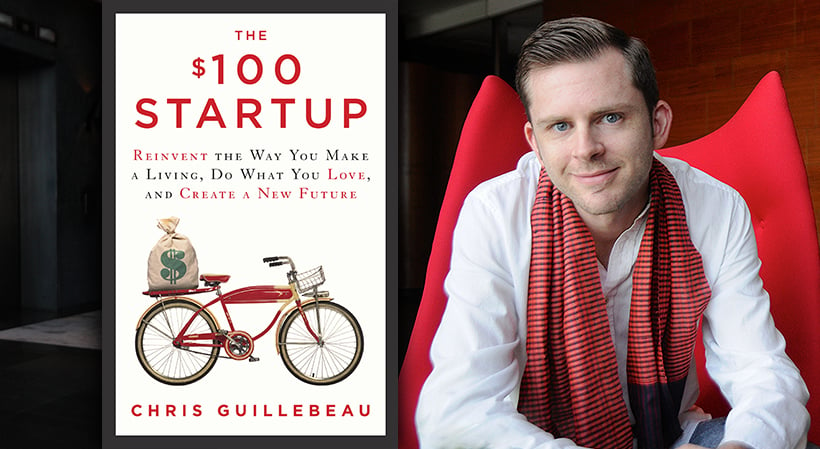StartupNation had the pleasure of interviewing Chris Guillebeau, author of “The $100 Startup.” In writing the book, Guillebeau identified 1,500 individuals who have built businesses earning $50,000 or more from a modest investment. The book covers the 50 most intriguing case studies from this group.
Guillebeau is a master at turning ideas into income, which then supports his life of adventure and giving back. Our interview with Guillebeau is as follows.
StartupNation: You’ve visited more than 175 countries around the world. That’s truly remarkable! How were you able to fund so much travel?
Guillebeau: I’m a travel hacker. I use Frequent Flyer Miles (more than a million a year) and other budget strategies to see the world without breaking the bank. I’ve also chosen to prioritize travel over other things in my life. I don’t own a car, for example, and I don’t buy a lot of physical things.
StartupNation: Please tell us about your book, “The $100 Startup.”
Guillebeau: It’s a blueprint for creating your own freedom through a small business, by using the skills you already have and without spending much money. The book is based on a two-year research project with more than 1,500 people who became “unexpected entrepreneurs.”
StartupNation: What was the catalyst for writing the book?
Guillebeau: As I traveled the world, I met all kinds of interesting people who were earning good incomes from doing something that they loved. I wanted to tell their stories in a way that other people could apply to their own lives.
Related: Q&A with Chris Guillebeau on Side Hustle School
StartupNation: Can any passion truly be turned into a business?
Guillebeau: Only some passions. The filter is, “how can this passion or interest be useful and valuable to someone else?” That’s the key starting point.
StartupNation: Can you tell us about any examples of people you’ve met who started with a passion, but then were able to build a larger, more significant company, with employees, an office, etc.?
Guillebeau: The book includes 50 stories out of the 1,500 we started from. There are all kinds of people, but most of them are deliberately solopreneurs–they preferred to focus more on keeping the business small and not hiring employees. That said, there were also a number of people who did scale to a certain degree. The Tom Bihn factory in Seattle is one good example.
StartupNation: What do you feel is the value of a business plan prior to turning your passion into a business?
Guillebeau: My position is: planning is good, but action is better. Most of our case studies started with a general idea of what they hoped to achieve, but I didn’t meet anyone who set out to write a 60-page traditional business plan, take it to the bank to beg for money, etc. They simply pursued an idea and adapted along the way.
Related: Sign up to receive the StartupNation newsletter!
StartupNation: Are there any lessons to be extracted from your book for someone who wants to start a business, and not necessarily travel?
Guillebeau: Yes, I’d say only about a third of our case studies were fundamentally interested in travel. Most people, however, were interested in freedom—the ability to determine one’s own priorities and schedule, as well as the chance to build something meaningful that made a difference in the world. The fact that they were able to do that while earning a good income was very inspiring to me, so I hoped to tell their stories well.
“The $100 Startup” is available now at fine booksellers and can be purchased via StartupNation.com.
This article was originally published on StartupNation.com on Oct. 17, 2012.






